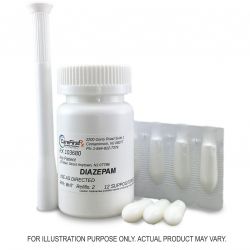Anal Fissures: A Pain in the Butt
What is an Anal Fissure?
An anal fissure is a tear in the lining of the rectum. This injury may occur while passing difficult bowel movements, during childbirth in a vaginal delivery, or during anal sex. It may also be caused by other conditions, such as Crohn’s Disease, tuberculosis, or anal cancer. This results in pain and bleeding in the anal cavity, particularly while passing bowel movements. It also causes the muscles of the anal cavity to spasm and constrict. This increased pressure around the anus decreases blood flow to the area and prevents healing of the fissure. If left alone for too long, structural changes may occur around the injury, becoming a chronic fissure.
The most common symptom of anal fissures is anal pain that worsens during and after passing bowel movements. Anal bleeding is also fairly common. Because these symptoms overlap with those of hemorrhoids, it can be difficult to distinguish the two. However, pain is less common and less associated with bowel movements in hemorrhoids, and a physical exam done by your doctor can help to differentiate the two.
How do you treat it?
When caught early, acute anal fissures are simple to treat. Simple fissures can often be managed by supportive care to ease bowel movements and promote healing of the fissures. Other fissures may require medication management, which typically involves topical creams compounded by a pharmacist and only available by prescription at a compounding pharmacy. Severe chronic cases may require surgery. While rates of healing are high with surgery, there is also a high risk of incontinence associated with it.
Supportive Care
60%-90% of anal fissures can be successfully managed by non-medical supportive care. The goal of this care is to provide comfort to the patient and make bowel movements easier to prevent worsening of the fissure and to allow the body to heal. Warm baths/sitz baths can provide comfort and relax the anal sphincter. Other strategies can help relieve constipation that may worsen the fissures, including increasing fluid and fiber intake and taking stool softeners.
Medication Management
For fissures not improved by supportive care, medical management may be necessary to facilitate healing. Many are topical creams that can be applied to the rectum that may require to be specially prepared by a compounding pharmacy. They often work by relaxing the anal cavity and aiding blood flow and healing to the area.
Nitroglycerin produces nitric oxide, which activates a cascade that leads to relaxation of smooth muscle. While nitroglycerin cream is commercially available at most pharmacies, compounding pharmacies can make a special formulation with lidocaine, an anesthetic, to provide additional pain relief.
Compounded nifedipine cream/ointment and diltiazem 2% cream/ointment are other options for medical management. They act by blocking the entry of calcium into cells, which prevents them from contracting and allows them to relax. Both creams are only available in the U.S. at compounding pharmacies, as they are normally manufactured only as tablets.
References
- Mapel DW, Schum M, Worley AV. The epidemiology and treatment of anal fissures in a population-based cohort. BMC Gastroenterol. 2014;14:129.
- Zaghiyan KN, Fleshner P. Anal Fissure. Clin Colon Rectal Surg. 2011 Mar;24(1):22-30.
- Ahmed R, Gearhart SL. Diverticular Disease and Common Anorectal Disorders. In: Jameson J, Fauci AS, Kasper DL, Hauser SL, Longo DL, Loscalzo J. eds. Harrisons Principles of Internal Medicine, 20e New York, NY: McGraw-Hill; http://accesspharmacy.mhmedical.com.proxy.libraries.rutgers.edu/content.aspx?bookid=2129§ionid=192282719. Accessed January 16, 2019.
- Nitroglycerin (topical). Lexi-Drugs. Lexicomp. Wolters Kluwer Health, Inc. Riverwoods, IL. Available at: http://online.lexi.com. Accessed January 18, 2019.
- Lidocaine (topical). Lexi-Drugs. Lexicomp. Wolters Kluwer Health, Inc. Riverwoods, IL. Available at: http://online.lexi.com. Accessed January 18, 2019.
- Nifedipine. Lexi-Drugs. Lexicomp. Wolters Kluwer Health, Inc. Riverwoods, IL. Available at: http://online.lexi.com. Accessed January 18, 2019.
- Diltiazem. Lexi-Drugs. Lexicomp. Wolters Kluwer Health, Inc. Riverwoods, IL. Available at: http://online.lexi.com. Accessed January 18, 2019.
- Anal Fissures (2013). [image] Available at: http://www.usa.chakrayog.com/diseases/anal-fissures.aspx [accessed 18 Jan. 2019].
- Sitz Bath for Hemorrhoids (2017). [image] Available at: https://hemorrhoids.qsota.com/sitz-bath-for-hemorrhoids/ [accessed 18 Jan. 2019].




Comments